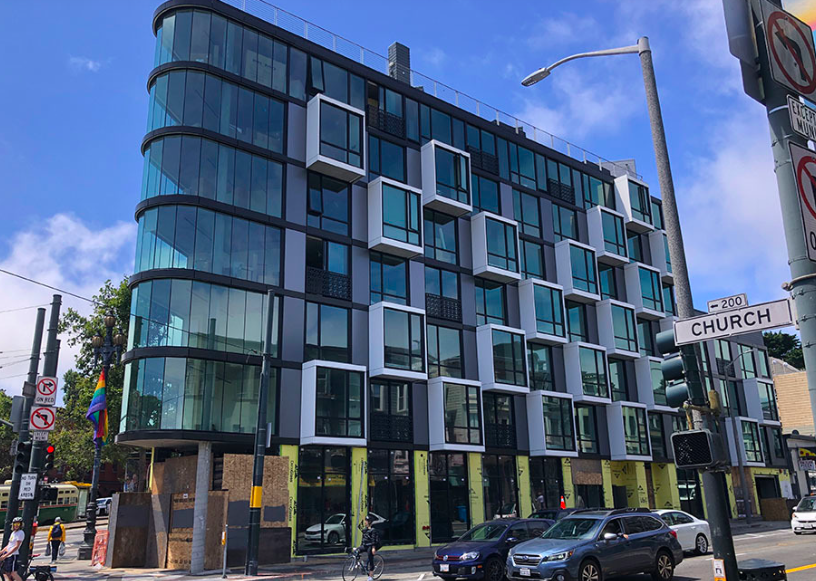More than 40,000 housing units—ten percent of the current housing stock—are currently vacant in San Francisco, a new report shows.
The data in the report, by the Board of Supervisors Budget and Legislative Analyst, strongly suggests that a significant percentage of new market-rate housing that’s been built in the city in the past ten years is still empty, and thus doing nothing to alleviate the housing crisis.
Some of the vacant units—7,241—are empty because they’re currently on the rental market. Another 2,400 are rented but the renter hasn’t moved in yet.

But 8,039 units have been sold to new owners who have not occupied the property, and 8,565 units have owners who use them for short-term seasonal or recreational purposes—that is, they come to the city every once in a while, and the rest of the time the place is empty.
So that’s more than 16,000 units that aren’t available for full-time residents.
One of the more dramatic elements of the report: In 2010, only 794 units were sold but unoccupied. In 2015, that number was 1547.
By 2019, after a luxury condo boom, it was 8,039—a 419 percent increase.
That suggests that roughly 22 percent of all the new units built in that period have never had anyone living in them.
From the report:
This type of vacancy may be due to owners buying new units while they are still under construction, but it may also be due to owners purchasing them as investments or cash havens with no intention of moving in or renting them out.
Add in the 8,565 units that are basically pieds a terre for very rich people, and you get a picture of a very warped housing market.
There are also apartments and condos that landlords are holding off the market because they think they can sell it or rent it for more money in the future. Some is also corporate housing.
The data is based on American Community Survey data from the Census Department, and it’s all aggregate: That is, we know the total numbers, but we don’t know which specific buildings are empty.
A report by 48hills several years ago found a lot of evidence that a lot of the new condos getting built are not occupied, at least not full time.
Fred Brousseau, who wrote the report, told the supes that the city’s rental registry, which will come on line later this year, will provide more information. But that doesn’t cover condos that are not on the rental market.
Brousseau said that registry could fairly easily be expanded to cover the rest of the city’s housing stock.
As I noted earlier, there’s another way to track vacant units, and that’s through water bills.
The report suggests a range of policy options, and the most obvious one is a vacancy tax. Other cities, including Vancouver BC, have tried that approach:
Like some U.S. cities, Vancouver, British Columbia, imposed an Empty Homes Tax on certain vacant units in 2016. The tax is a surcharge on the assessed value of vacant units, identified through a self-registration process. The city reports that their overall vacancy rate decreased from 4.3 to 3.1 percent as a result of the tax and that 1,676 units were returned to occupancy in 2018, followed by an additional 220 in 2019. This number is expected to decline in subsequent years, seemingly a sign that the tax is having its intended impact.
Vancouver’s Empty Homes Tax generated the equivalent of approximately $21.3 million US dollars in 2019, the net proceeds of which were used by the city for affordable housing initiatives. Exemptions to the tax are provided for reasons such as the property being in the process or being transferred, the owner being in a care facility, and others.
More important, perhaps:
The City of Vancouver reported a 21.2 percent reduction in vacant units the first year after its vacancy tax was adopted.
Oakland also has a residential vacancy tax. The report suggests that the city could raise a lot of money from that kind of levy:
Assuming an estimated 4,600 to 7,300 vacant units in San Francisco that would be subject to a vacancy tax, we estimate San Francisco could generate between $12.2 and $61.2 million per year in net revenue initially, or an amount in between depending on whether it adopts a tax similar to Oakland’s on the low side or Vancouver, B.C.’s on the high side. Our mid-range net revenue estimate is approximately $38.9 million per year.
And that money, of course, could go for affordable housing.
“If one in ten units in the city is vacant, this is a very significant policy issue,” Sup. Dean Preston, who asked for the report, said during the hearing. “We need to activate these homes.”
We also need to recognize that the idea that San Francisco can let the private market build us out of this crisis—the central assumption of the Yimby movement—has no basis in fact. If almost a quarter of all the new units that developers are building are empty, and as many as half or more are either empty or only occupied part-time by people who use them as occasional vacation homes, then that strategy is just going to fail.





